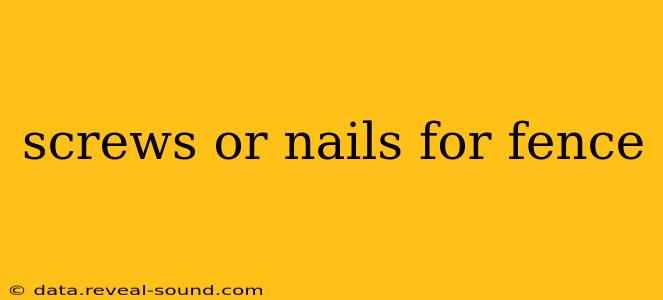Choosing between screws and nails for your fence project can significantly impact its longevity, aesthetics, and overall strength. While both fasteners have their place, understanding their respective advantages and disadvantages is crucial for making the right decision. This comprehensive guide will explore the key differences, helping you determine whether screws or nails are the ideal choice for your fence.
What are the Pros and Cons of Using Screws for Fences?
Screws offer several advantages over nails, particularly in fence construction where durability and longevity are paramount.
Pros:
- Superior Holding Power: Screws create a stronger, more secure hold than nails, resisting forces like wind and ground movement better. The threads bite into the wood, preventing the fastener from pulling out easily.
- Reduced Wood Splitting: The tapered design of screws minimizes the risk of wood splitting, especially when working with hardwoods or pressure-treated lumber. This is a significant advantage over nails, which can easily split wood, especially when driven in at an angle.
- Easier Removal and Repair: Should you need to dismantle or repair sections of your fence, screws are much easier to remove than nails. This makes maintenance and modifications significantly simpler.
- Improved Aesthetics: Screws generally offer a cleaner, more professional look than nails, particularly when using countersunk screws and wood filler. This is especially important for aesthetically-pleasing fences.
Cons:
- Higher Cost: Screws are typically more expensive than nails, potentially increasing the overall cost of your project.
- Slower Installation: Driving screws takes longer than hammering nails, especially for large fence projects. This can be a significant factor if you're working against a tight deadline.
- Requires a Power Tool: You'll need a drill or impact driver to install screws, whereas nails can be hammered by hand. This adds to the upfront cost and requires specialized equipment.
What are the Pros and Cons of Using Nails for Fences?
Nails have traditionally been the go-to fastener for fence building due to their speed and affordability. However, they have some limitations compared to screws.
Pros:
- Fast and Efficient: Nails can be driven in quickly, speeding up the fence construction process considerably.
- Cost-Effective: Nails are significantly cheaper than screws, making them an attractive option for budget-conscious projects.
- Can Be Hammered By Hand: No power tools are needed, making them accessible for DIYers without specialized equipment.
Cons:
- Lower Holding Power: Nails offer less holding power compared to screws, making them more susceptible to loosening over time due to wind, ground movement, or wood shrinkage.
- Increased Risk of Wood Splitting: Nails have a greater tendency to split wood, especially when driven into hardwoods or at an angle.
- Difficult to Remove: Removing nails can be challenging and can damage the surrounding wood, making repairs more difficult.
- Less Aesthetically Pleasing: Nails generally leave a less refined appearance than screws, especially if not countersunk or covered.
What Type of Wood is Best for Fence Construction?
The choice of wood also impacts your fastener selection. Hardwoods are more resistant to splitting but may require screws to prevent damage. Softer woods are more forgiving with nails but may require more frequent maintenance. Pressure-treated lumber, commonly used for fences, is dense and can benefit from the superior holding power of screws.
Which Fastener is Right for My Fence Project?
The best choice – screws or nails – depends largely on your priorities:
- For maximum strength, longevity, and a professional finish: Screws are the superior choice. The increased holding power and reduced risk of splitting make them ideal for long-lasting fences in demanding conditions.
- For a budget-friendly, fast project where aesthetics are less critical: Nails might suffice. However, be prepared for potential issues with holding power and wood splitting, and consider using galvanized nails for improved durability.
Ultimately, the decision between screws and nails for your fence depends on your budget, the type of wood you're using, the desired aesthetic, and the level of durability you require. Weighing these factors carefully will help you choose the best fastener for your specific needs.
